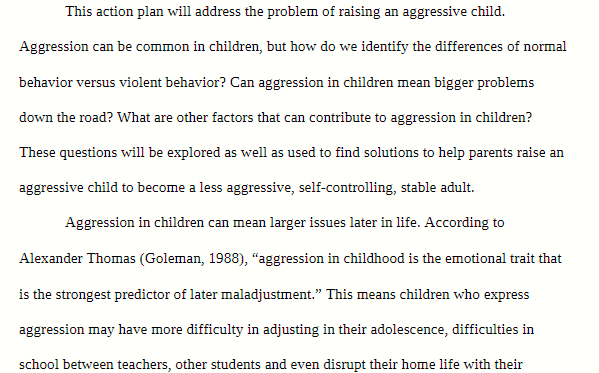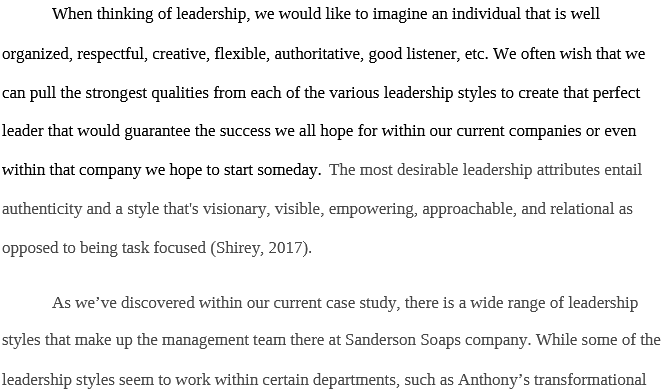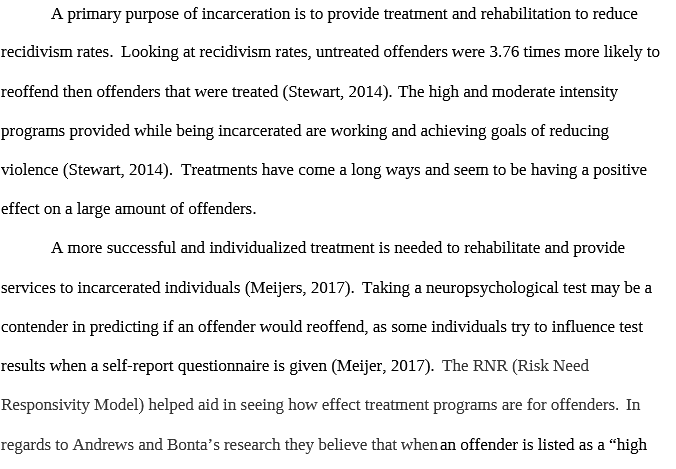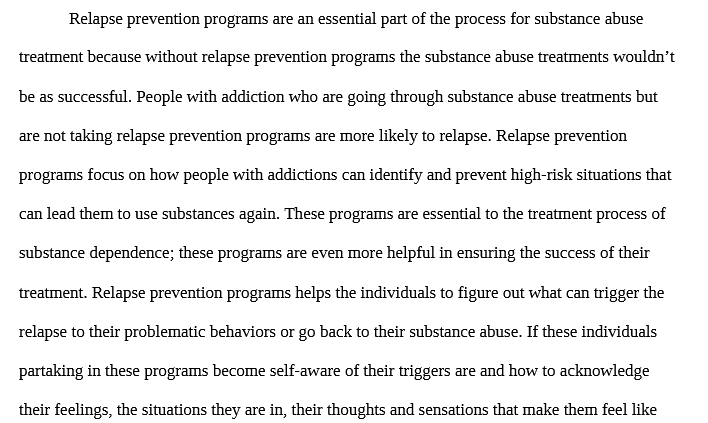PSY 108 PSY108 Final Project _ Psych 2017.docx – Snhu
$7.99$16.99
PSY 108 PSY108 Final Project _ Psych 2017.docx – Snhu
Getting started this action plan will address the problem of raising an aggressive child. Aggression can be common in children, but how do we identify the differences between normal behavior versus violent behavior? Can aggression in children mean bigger problems on the road? What are other factors that can contribute to aggression in children? These questions will be explored as well as used to find solutions to help parents raise an aggressive child to become a less aggressive, self-controlling, stable adult. Aggression in children can mean larger issues later in life. According to Alexandre Thomas (Goleman, 1988), “aggression in childhood is the emotional trait that is the strongest predictor of later maladjustment.” This means children who express aggression may have more difficulty in adjusting in their adolescence, difficulties in school between teachers, and other students, and even disrupt their home life with their families (Goleman, 1988). Growing up is tough enough but to add this factor on top, we need to find a solution for these children so they can learn to deal and adjust accordingly to live a happier, normal life. The first source, “Parents’ Assessment of Parent-Child Interaction Interventions,” describes a study performed in Sweden on 101 families who had concerns about behavioral problems displayed by their children as well as difficulty or dysfunction in the interaction between child and parent.
Description
PSY 108 PSY108 Final Project _ Psych 2017.docx – Snhu
Getting started this action plan will address the problem of raising an aggressive child. Aggression can be common in children, but how do we identify the differences between normal behavior versus violent behavior? Can aggression in children mean bigger problems on the road? What are other factors that can contribute to aggression in children? These questions will be explored as well as used to find solutions to help parents raise an aggressive child to become a less aggressive, self-controlling, stable adult. Aggression in children can mean larger issues later in life. According to Alexandre Thomas (Goleman, 1988), “aggression in childhood is the emotional trait that is the strongest predictor of later maladjustment.” This means children who express aggression may have more difficulty in adjusting in their adolescence, difficulties in school between teachers, and other students, and even disrupt their home life with their families (Goleman, 1988). Growing up is tough enough but to add this factor on top, we need to find a solution for these children so they can learn to deal and adjust accordingly to live a happier, normal life. The first source, “Parents’ Assessment of Parent-Child Interaction Interventions,” describes a study performed in Sweden on 101 families who had concerns about behavioral problems displayed by their children as well as difficulty or dysfunction in the interaction between child and parent.
PSY 108 PSY108 Final Project _ Psych 2017.docx – Snhu
These families were assessed based on self-reports provided themselves, the parents, to determine the short and long-term changes experienced through parent-child interventions. There was a focus on major areas to which the adult had to learn to improve upon to see if that helped in the interaction with the child and the child’s interaction with others daily and going forward. The purpose of this research was to show that with the parent taking part in a parent-child intervention the results of the child’s conduct and interactions can be positive in the long term. The researcher met the purpose of the research by studying families using different methods of time (T1, T2, T3)and tests such as the Wilcoxon’s Sign-Rank test and Cohen’s d, to determine if parent-child interaction interventions make a difference in the development of aggressive children. It was determined that “the results of the study showed that the subjective assessment of parents partaking in parent-child interventions was that less parental stress was experienced” as well as, “the children’s problems – especially conduct problems –had decreased, as had the effect in their daily life” (Neander & Engström, 2009). A theory mentioned in my source is attachment theory which is a family-oriented approach to early childhood intervention.
PSY 108 PSY108 Final Project _ Psych 2017.docx – Snhu
- PSY 211 – Lifespan Development (5015 Documents),
- PSY 215 – Abnormal Psychology (4335 Documents),
- PSY 108 – Introduction to Psychology (3759 Documents),
- PSY 223 – Statistics for Psychology Research (2652 Documents),
- PSY 216 – Psychology of Personality (1841 Documents),
- PSY 510 – Research Methods (1748 Documents),
- PSY 520 – Research Methods in Psychology II (1469 Documents),
- PSY 257 – Psychology (1451 Documents),
- PSY 310 – Criminal Psychology (1393 Documents),
- PSY 200 – FOUNDATIONS OF ADDICTIONS (1379 Documents),
Only logged in customers who have purchased this product may leave a review.







Reviews
There are no reviews yet.